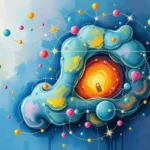
Introduction
Dreams have long been a source of fascination and curiosity for humanity. They serve as a mirror, reflecting our thoughts, emotions, and experiences in often enigmatic ways. Among these dreams, bad dreams—commonly known as nightmares—hold a particular intrigue. They can evoke feelings of fear, anxiety, and deep emotional distress. Yet, despite their unsettling nature, these dreams can provide valuable insights into our subconscious. Understanding why we experience bad dreams and what they signify can empower us to better navigate our waking lives.
In this article, we will delve into the symbolism and meanings behind bad dreams, explore various scenarios and their interpretations, and discuss how these experiences can connect to our real lives. By doing so, we hope to shed light on the hidden messages that may lie beneath the surface of our most unsettling nighttime experiences.
Symbolism and Meaning
Bad dreams often feature vivid and disturbing symbols that can vary widely from person to person. However, certain motifs appear frequently and have been studied across cultures and psychological frameworks.
One prevalent symbol in nightmares is being chased. This scenario typically represents feelings of anxiety or a sense of threat in waking life. The pursuer in these dreams could symbolize a specific fear, an unresolved conflict, or even an aspect of oneself that one is trying to avoid. For instance, if you dream of being chased by a menacing figure, it could indicate that you are running away from responsibilities or emotions that you need to confront.
Another common symbol is falling. Falling dreams can evoke a sense of helplessness and loss of control. Psychologically, they may reflect feelings of insecurity or fear of failure in certain situations. This could relate to a recent decision, a new job, or a relationship where you feel uncertain about your footing.
Natural disasters—such as floods, earthquakes, or tornadoes—often appear in nightmares as well. These symbols might represent overwhelming emotions, such as grief or anger, that are threatening to consume you. In this context, the disaster becomes a metaphor for internal turmoil.
Teeth falling out is another recurring nightmare theme. This imagery is frequently associated with feelings of inadequacy or fear of aging and loss. It can also signify concerns about self-image or communication, as teeth are essential for both aesthetics and speech.
While these symbols generally have shared meanings, it’s important to recognize that individual context plays a significant role in dream interpretation. What resonates with one person might not hold the same significance for another. Therefore, incorporating personal experiences will deepen your understanding of what your bad dreams may be trying to convey.
Key Scenarios and Variations
The context of a nightmare can greatly influence its interpretation. While the symbols themselves may be similar, the scenario can shift meanings dramatically.
For instance, a dream about being trapped can be interpreted in various ways depending on the setting. If you find yourself trapped in a small room, it may symbolize feelings of confinement in your waking life, possibly related to a job or relationship that feels suffocating. On the other hand, being trapped in a vast, open space may suggest feelings of being overwhelmed by choices or possibilities, indicating that you might be struggling to make a decision.
The presence of others in your nightmares can also alter your interpretation. If you dream of being lost in a crowd, it may reflect feelings of isolation or inadequacy among peers. Conversely, if you dream of friends or loved ones abandoning you, it could highlight your fears of rejection or abandonment in real-life relationships.
Another interesting scenario is the fight or flight response. If you dream of fighting back against your pursuer, it can signify empowerment and a desire to confront your fears. However, if you find yourself paralyzed or unable to react, it could indicate feelings of powerlessness in your waking life, suggesting that there are issues you feel unable to confront.
Moreover, the setting of the dream plays a crucial role. Nightmares set in familiar locations, like your childhood home, may evoke memories or unresolved issues from that period in your life. Conversely, an unfamiliar or surreal setting may symbolize uncertainties or fears about future events.
Even variations in the emotional tone of the dream can significantly affect its interpretation. A nightmare that leaves you feeling relieved upon waking might suggest that you are subconsciously processing your fears, while one that leaves you in a state of dread can indicate that these fears are still unresolved and need to be addressed.
Real-Life Connections and Takeaways
Connecting the dots between bad dreams and real-life situations can be a powerful tool for self-reflection and personal growth. When you wake from a nightmare, take a moment to jot down the details of your dream. Reflect on the symbols, scenarios, and emotions involved, and consider how they might relate to your current life circumstances.
Ask yourself questions like: What was happening in my life around the time I had this dream? Are there any unresolved issues or emotions that I’ve been avoiding? Are there areas in my life where I feel out of control, anxious, or insecure? This introspection can help you uncover the underlying themes of your nightmares and offer insights into your waking life.
Additionally, practicing mindfulness and stress-reduction techniques can help mitigate the frequency of bad dreams. Engaging in activities like meditation, journaling, or talking with a therapist can facilitate emotional processing. These practices not only aid in understanding your dreams but also help alleviate the stressors that may trigger them.
You might also consider addressing the specific fears or challenges highlighted in your nightmares. For example, if you often dream about failing an exam, it may be beneficial to develop a study plan or seek support in understanding the material. If feelings of abandonment frequently surface in your dreams, nurturing your relationships or seeking new connections can create a sense of security and belonging.
Lastly, remember that bad dreams are not inherently negative. They can serve as a catalyst for change, prompting you to confront aspects of your life that require attention. Embracing the lessons from your dreams can lead to profound personal development and a greater understanding of yourself.
In conclusion, bad dreams can be a window into our subconscious, revealing fears, anxieties, and unresolved emotions. By analyzing the symbols and scenarios within these dreams, we can gain valuable insights into our waking lives. Taking the time to reflect on these experiences allows us to connect the dots between our dreams and real-life situations, ultimately empowering us to navigate our fears and embrace personal growth. So, the next time you find yourself in the grip of a bad dream, remember that it might be your mind urging you to pay attention and make meaningful changes in your life.







